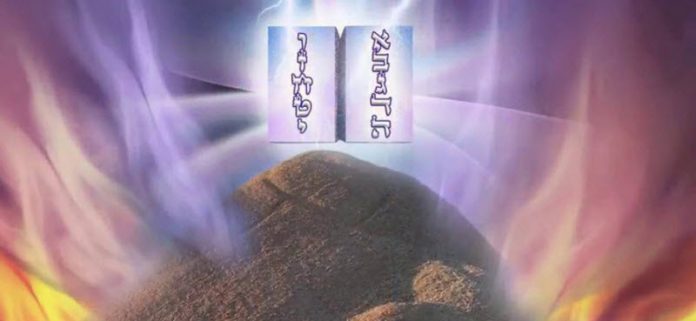The Ten Commandments That Shook the World
The narrative you are about to read is unique in the history of mankind. It is an event never repeated by any other nation or religion.
Dateline: The 6th of Sivan, 50 days after the Exodus.
Year: 2448 from Creation.
Day and Time: Shabbat morning at sunrise.
Place: Mount Sinai in the Sinai desert.
Scene: The entire world is silent. All of nature is on hold. Not a bird chirps! Not a frog burps! The Jewish people (who somehow slept that night!) are en route to their divine encounter at the mountain.
Soon will be enacted the most important event in human history.
Suddenly there is thunder, lightning and a loud shofar blast. The mountain is smoking like a furnace and trembling like a volcano. The people are terrified. The Divine Presence descends on the mountain in the form of a great fire.
All the people hear Moses being summoned to converse with the Almighty. They have clear evidence, without doubt, that Moses is the prophet of God.
God tells Moses to fence off the mountain so the people cannot run up.
The first Commandment is proclaimed. The entire nation attains prophecy by hearing the words of the Almighty directly. But they cannot absorb the intensity and their souls “pop out” of their bodies.
The angels resurrect them, and the people run for their lives. The angels return the people to the mountain, and the second Commandment thunders forth. Again their souls “pop out,” again the angels revive them, and again they flee in fright (Talmud – Shabbat 85b).
Finally the people request that Moses transmit the remainder of the Torah because they are afraid of death (Exodus 20:16). They tell Moses: “You have had your credentials established. We know you are in contact with God and we trust you.” (Notice how the first two commandments are given in the 2nd person, and the last 8 in the third person.)
TO SEARCH FOR TRUTH
This Parsha, perhaps the most important in the Torah, is named after a convert, Yitro, who also happens to be Moses’ father-in-law. Why did Yitro merit such honorable mention?
Yitro was a searcher for truth. He resigned his prestigious position as Pharaoh’s advisor when his advice to spare the Jews was not heeded. Yitro investigated every form of idol worship and tried out every cult, even fattening up animals to sacrifice them to the gods.
In the end, Yitro rejected all idolatry, and when he heard about the miracles of the Exodus, he ran to the wilderness to join the Jewish people.
This Parsha is named Yitro to teach us that the way to acquire Torah is to follow the ways of Yitro. Search for truth and be critical. Reject falsehood. And when you discover truth, be ready to sacrifice everything for it! (Rabbi Shlomo Wolbe)
When Yitro came to the desert, he brought Moses’ wife and children with him. (Moses had sent them away from Egypt out of fear they’d become slaves.) Moses and the entire camp went out to meet Yitro.
Yitro says that upon hearing the details of the Exodus, he was greatly inspired to the point of goose bumps (Rashi). Yitro recognized the “measure-for-measure” punishment of each and every plague, and decided to become a Jew.
The people welcomed Yitro with a banquet in his honor — and Moses serving as the waiter. As the Talmud says: When you partake of a meal with Torah scholars, it is compared to dining with the Divine Presence.
The next day, Yitro begins criticizing Moses, and as a result advises him to create the first Supreme Court system. Yitro departs to convert his family (mentioned here, although it didn’t occur until much later).
EVENTS LEADING UP TO THE REVELATION (based on Midrash)
(1) The people arrive at Mount Sinai and encamp across from the mountain (Exodus 19:2).
Although they were just attacked by Amalek, they didn’t encamp on the mountain for protection, out of their faith in God. (Rabbi Shimshon Raphael Hirsch)
(2) God tells Moses to call all the women together and gently explain to them the significance of the holy Torah they are about to receive. (Exodus 19:3, Rashi)
Only afterward does Moses call the men together and spell out the Mitzvah responsibilities. The women went first because of the tremendous influence they have on the Jewish family. A mother’s approach is the most significant factor in creating a peaceful and stable home.
(3) God proclaims the goal of the Revelation:
“You shall be My treasured nation (like the special treasure room of the palace) if you obey My commandments.” (Exodus 19:5)
(4) God then says:
“You shall be a kingdom of Priests and a holy nation.” (Exodus 19:6)
No intermediaries are necessary; every Jew stands 3 times a day before the Creator and addresses Him in the second person.
(5) The people hear Moses conversing with God and believe in Moses forever.
Even later generations who did not personally witness the national revelation will believe it, because it is a claim that cannot be fabricated, and the Jewish people are (and will always be) the only ones to make the claim (Nachmanides, see Deut. 4:32).
RESPONSE OF THE PEOPLE
(6) The Jews respond:
“Whatever God says we will fulfill.” (Exodus 19:8)
This was the first time in Jewish history that the Jews unanimously agreed about anything!
Later, the Jews add “and we will hear” – meaning we will try to understand. But first we will do. (E.g., If you trust the doctor, you first take the prescription and then go to medical school.)
Did you ever hear the anti-Semitic ditty: “How odd of God to choose the Jews”?
The Sinai experience helps provides an answer: “It’s not so odd. The Jews chose God!” (heard from Rabbi Yaakov Weinberg zt”l)
(7) First the Almighty went to all the nations of the world (or their guardian angels) and offered them the Torah.
“What does your Torah say?” they demanded to know. “We don’t sign blank checks!”
To one nation, God said, “Do not murder.”
“Such a Torah is not for us!” they cried.
To another nation, God said, “Do not commit adultery.”
“Wrong address” they replied.
To another nation, God said, “Honor your parents.”
“Come on! Isn’t Mothers’ Day good enough??”
Only the Jews accepted God’s word unconditionally. (“How much does it cost? It’s free! In that case, we’ll take 10!”) (Midrash – based on Deut. 33:2)
Question: Why did God tell these nations all the things they didn’t want to hear? Did He purposely want them to refuse?
Answer: They already rejected the Torah as soon as they asked what it says. It is wrong to judge Divine values based on one’s own narrow value system.
It’s like if I say: “I am offering you absolute truth. Do you want it?”
“That depends.”
“What do you mean, ‘It depends’!? That’s like if I offer you the results of your medical exam. It depends – can I still drink and smoke?” Therefore God made sure they refused (heard from Rabbi Motty Berger).
TEN COMMANDMENTS EXPLAINED
(The first five pertain to Man and God.)
COMMANDMENT #1: “I am the Lord your God who took you out of the land of Egypt.”
Question: What is the commandment here? It seems to be a statement! There cannot be a commandment to believe in God. If you don’t believe, then who would be commanding you to believe? And if you already believe, what do you need a commandment for?? (Rabbi Yaakov Weinberg, based on Maimonides)
Answer: The first commandment is to know there is a God (Maimonides). After you “believe,” you need to use your mind and “know.” See the design in Creation, the genius of the Torah etc., until you are convinced intellectually as well as emotionally.
COMMANDMENT #2: “You shall have no other gods before me.”
Do not make or worship idols. Idolatry means to bring God, the ultimate value, down to us – i.e. to humanize God instead of elevating man to spiritual heights.
Idolatry (in its broader sense) also includes making any physical act a goal, instead of a means. Food, money, sex, power and sports can all be idols if they become ends in themselves.
The first Mitzvah applies to our mind; the second Mitzvah applies to our actions.
COMMANDMENT #3: “Do not take God’s Name in vain.”
A false or unnecessary oath is taking the Almighty as a witness in vain. Even secular courts make a witness put his right hand on a Bible. “Do you swear to tell the truth, the whole truth and nothing but the truth?” (“I didn’t do it!” Do you believe him?)
The Talmud says that when the 3rd commandment was uttered, the entire world trembled and all of the nations heard it as well.
This commandement applies to speech.
COMMANDMENT #4: “Remember the Shabbat day to sanctify it.”
In order to concretize our belief in one God, we must dedicate one day a week to Him.
In Deuteronomy Chap. 5, when the Ten Commandments are repeated, it says “Keep the Shabbat day holy.”
God said both “remember Shabbat” and “keep Shabbat” simultaneously (Talmud, Shabbos).
The duel aspects of Shabbat are the positive aspect (“remember”) and the negative aspect (“keep”).
The negative is compared to Rockefeller Center in New York donated to the public but still owned by Mr. Rockefeller. It is closed to the public one day a year in order for him to retain his private ownership. Similarly, the world belongs to God and He allows humanity to manage the world. But to prevent anyone thinking erroneously that the world is ours to do as we please, one day a week we “give the world back to God” by not doing any act that demonstrates our mastery of the world.
Why are so many activities prohibited on Shabbat? “Years ago it took much work to rub two sticks together and make fire, but today we just scratch a match or push a button!” so goes the old rationale. It isn’t physical labor that is forbidden, but creative activity. However if one would spend the entire Shabbat in bed he would not have broken the negative aspect.
The positive aspect is compared to someone lost in the woods. Which way should he turn? First open your map and get out your compass. Get your bearings and decide where to go. Similarly in life we need time to focus ourselves, unpressured by the demands of daily activities (teachers, boss, schedules) – to get a true picture of our accomplishments and goals.
COMMANDMENT #5: “Honor your father and mother.”
Question: The first tablet contains laws between humanity and God. The second tablet is between one person and another. Thus it would seem that Commandment #5 – honoring parents – is on the wrong tablet!
Answer: The example par excellence of the relationship we have with God is the parent-child relationship. It is based purely on gratitude. With God, it is abstract; with parents it’s concrete. Parents brought you into the world and changed your diapers! They bought you food, clothes, and toys and stayed up when you were ill. If we don’t honor our parents, how will we be able to transfer this respect to our Creator?
The transmission of our tradition is only possible out of respect for the previous generation. They are one link closer to the source! All Jewish tradition is based on this.
The last five commandments pertain to human relations:
COMMANDMENT #6: “Do not murder.”
Some confuse this with “do not kill.” There are times when one must kill – e.g. self defense, or in wartime. We are not idealized pacifists! Only what the Torah declares to be murder is “wrong.”
In a pagan world of gladiators and coliseums, of human sacrifice and infant and mercy killing, the value of human life was very cheap. The Torah considers the preservation of life to be an ultimate value. The punishment for murder (with witnesses and a proper warning) is the death penalty.
COMMANDMENT #7: “Do not commit adultery.”
This Mitzvah addresses the sanctity of married life. Instead of seeing one’s spouse as a jail keeper preventing him from enjoying other liaisons, the Torah sees a spouse as a provider exclusively for him, in order to prevent him from even thinking of others.
Solid family life and a stable home is the bedrock of society. To infringe on the husband-wife relationship is to endanger the microcosm of the home, and ultimately society at large. The positive marital relationship is embedded in this strong prohibition, whose punishment (with witnesses and warning) is the death penalty.
COMMANDMENT #8: “Do not steal.”
This verse refers to “do not kidnap” (stealing money is mentioned elsewhere), which is a capital punishment if there are witnesses and warning (Talmud).
COMMANDMENT #9: “Do not bear false witness.”
Human beings are enjoined to keep their speech pure. One of the worst injustices is to pervert a verdict.
COMMANDMENT #10: “Do not covet.”
This commandment applies to the mind. It is a uniquely God-given law. No other law book mentions it. Just try prosecuting someone for “coveting!” Except for the all-knowing God, there’s no way to know another person’s thoughts – and whether he’s coveting the other person’s house, spouse, and money.
Question: Why do the laws between humanity and God have thoughts before words and actions, and the laws between people have actions first?
Answer: When it comes to humanity and God, the most important thing is your intention. First the mind, then actions and words. Let everyone know what you believe and then apply it to your life. Actions without beliefs are meaningless, like putting Tefillin on a monkey!
When it comes to the laws between people, the actions come first, and then speech and mind. “I don’t care if you hate his guts, but don’t murder!”
credit to aish.com












